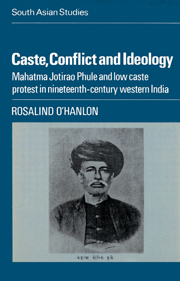 Caste, Conflict and Ideology
Caste, Conflict and Ideology Book contents
- Frontmatter
- Contents
- Acknowledgements
- Notes on translations and area under study, with map
- Part 1 Introduction
- Part 2 Religion and society under early British rule
- Part 3 Jotirao Phule and his circle: the emergence of a distinctive radical voice
- 5 Student radicals in mid-nineteenth-century western India
- 6 Christianity and the attack on caste in Phule's early writing
- Part 4 The creation of a lower caste identity in history and popular culture, 1869–73
- Part 5 The lower caste community in contemporary society
- Part 6 Ideology and the non-Brahman movement in the 1880s
- Bibliographic note
- Bibliography
- Glossary
- Index
5 - Student radicals in mid-nineteenth-century western India
from Part 3 - Jotirao Phule and his circle: the emergence of a distinctive radical voice
Published online by Cambridge University Press: 14 October 2009
- Frontmatter
- Contents
- Acknowledgements
- Notes on translations and area under study, with map
- Part 1 Introduction
- Part 2 Religion and society under early British rule
- Part 3 Jotirao Phule and his circle: the emergence of a distinctive radical voice
- 5 Student radicals in mid-nineteenth-century western India
- 6 Christianity and the attack on caste in Phule's early writing
- Part 4 The creation of a lower caste identity in history and popular culture, 1869–73
- Part 5 The lower caste community in contemporary society
- Part 6 Ideology and the non-Brahman movement in the 1880s
- Bibliographic note
- Bibliography
- Glossary
- Index
Summary
Introduction
Small but centrally placed groups of Hindu reformers thus experienced a profound upheaval in their religious values and in their confidence in existing social institutions. This disquiet amongst Hindus themselves, together with the highly effective propaganda campaigns of protestant Christian missionaries, formed the most important influences upon the reformist ideas of the young generation of students at the mission and English government schools in the larger urban centres of western India. During the 1840s Jotirao Phule was a student at a school in Pune run by the missionaries of the Free Church of Scotland. His caste was a reflection of the social heterogeneity of the Scottish mission school. While children of the untouchable Mahar and Mang castes were very few, the school accepted pupils from a very wide variety of cultivating, artisan, and trading castes, as well as from the customarily literate higher castes.
The Mali caste, to which Phule's family belonged, were gardeners. They made their living in western Maharashtra cultivating fruit, flowers, and vegetables, often using a network of kin connections to transport their produce to market and sell it. With this simultaneous concern with semi-rural cultivation and with large urban markets, the Mali caste often acted as a medium of contact between rural areas and the growing urban centres of western India. The Malis ranked as Shudra in the four-fold varna scheme. In the local caste hierarchy, however, they appear to have occupied quite a respectable position, roughly equivalent to that of Maharashtra's large grouping of peasant, land-holding, and cultivating castes, the Maratha-kunbis.
- Type
- Chapter
- Information
- Caste, Conflict and IdeologyMahatma Jotirao Phule and Low Caste Protest in Nineteenth-Century Western India, pp. 105 - 121Publisher: Cambridge University PressPrint publication year: 1985
